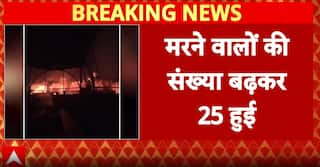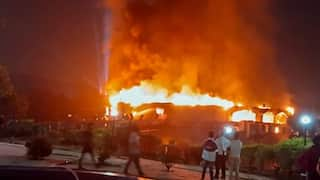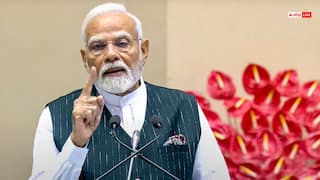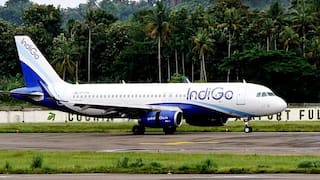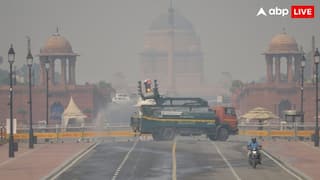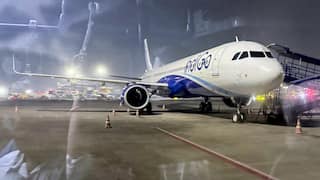Space Has A Lot Of Junk Flying Around And It's A Growing Threat. New Research Centre In UK To Now Track Them
Team of scientists from University of Warwick has established Centre for Space Domain Awareness, a first-of-its-kind research centre in UK, to tackle threats posed by space junk

New Delhi: Dead satellites that failed or were left in orbit at the end of their mission, parts of a rocket, defunct artificial objects — there is a lot of junk flying around in space.
The National History Museum mentions that about 3,000 dead satellites, 34,000 pieces of space junk, larger than 10 centimetres in size, and millions of smaller pieces, are stranded in space.
Since space junk could prove disastrous if they hit other functional space equipment, there is a pressing need to address the threats of space debris.
A team of scientists from the University of Warwick has established the Centre for Space Domain Awareness, which is a first-of-its-kind research centre in the UK, to tackle the threats posed by space junk in the skies.
The centre was launched on September 8, at the annual meeting of GNOSIS (The Global Network on Sustainability in Space). It aims to conduct research in sustainable use of space, and this would mark another step towards the fulfilment of the UK's ambition to become a responsible spacefaring nation, according to a press release issued by the University of Warwick.
Why space junk is a growing problem
There has been an accumulation of orbital debris in near-Earth space, over the past 60 years. Active satellites are not the only things in orbit. This is because rocket bodies, abandoned spacecraft, and the fragments of rockets from explosions and collisions also exist in orbit, the Centre for Space Domain Awareness (CSDA) says on its website.
The current generation of surveillance networks still can't see large amounts of space debris, and numerous constellations of satellites are going to be launched in future, because of which Space Domain Awareness is facing many challenges.
The Low Earth Orbit (LEO) and the Geosynchronous (GSO) region are the two areas of concern, in terms of dangers posed by space debris. The most densely populated orbital bands and the International Space Station are located in Low Earth orbit, which is less than 1200 km. It is presumed that certain regions of LEO are on the verge of triggering a phenomenon known as the 'Kessler Syndrom', a process in which the fragments generated by one collision will induce further collisions, and so on, the centre says.
Faint, poorly characterised debris is harboured by the GSO, which is situated at a much higher altitude above the Equator. The number of orbital slots in the GSO region is limited.
Since the start of space exploration, around 6,000 satellites have been launched into orbit, and most of them are located in LEO, and the number will massively increase in future, according to scientists from the University of Warwick.
Telecommunications, internet infrastructure, and Earth Observation, which are the space-for-Earth industries relying on satellites to provide services to people, are under increasing threat due to the near-Earth environment becoming littered with debris from space launches and decommissioned spacecraft that was left to burn up in the atmosphere.
What the UK centre aims to achieve
The Centre for Space Domain Awareness has been established with the aim to investigate challenges of monitoring objects in Earth orbit, and find new methods of tracking space debris in the regions of concern.
The researchers will also investigate how space weather can threaten spacecraft. Many new satellites and mega-constellations, meant to provide important services such as navigation, Earth observation, and communications, will be launched in the coming years, because of which a rapid expansion in the congestion of near-Earth space is expected. This is another reason behind the establishment of this Centre.
Technology in Earth orbit is constantly under threat, and the centre will conduct research to address these dangers.
The researchers will study the near-Earth environment, including space junk that has the potential to collide with orbiting satellites, and solar winds which could interfere with the satellite electronics, in order to support scientific, governmental, commercial and military applications, according to a statement by the University of Warwick.
Project DebrisWatch, another initiative by scientists at the University of Warwick, aims to devise new methods of searching for space debris in orbit.
Centre will track objects, tackle increasing congestion in space
Professor Don Pollacco, Director of Centre for Space Domain Awareness, says that the researchers at the new centre will be studying the impact of solar winds in satellites and the Earth's atmosphere, and also the impact of space debris, in all orbital regimes, on spacecraft, according to the statement. He also says that space traffic will soon become a big issue, and must be addressed soon. Space traffic could pose numerous threats and affect the modern society dependent on space.
He added that though the distribution of debris with orbital height was not known, some orbits were known to have significant debris in them, which is moving fast, and even a very small amount of debris could damage an entire spacecraft.
Jacob Geer, Head of Space Surveillance and Tracking at the UK Space Agency, says that the threats of space junk could significantly affect our day-to-day activities because the debris is dangerous for satellites. He added that the Centre will track objects to reduce and tackle the increasing congestion in space, which will add to civil and military benefits.
Dr William Feline, of the Defence Science and Technology Laboratory (DSTL), says the lab has been working with Professor Pollacco and his team to monitor space debris and satellites, with the help of technology such as world-class observatory facilities on La Palma in the Canary Islands. He added that the new centre will address the challenges faced by the UK and the world.
Katherine Courtney, Chair of the GNOSIS Board, said that the new Centre for Space Domain Awareness will help accelerate progress in understanding the nature and scale of space debris problems and will provide fresh solutions for combatting the risks posed to spacecraft from space weather, congestion and debris, which are a global concern.












